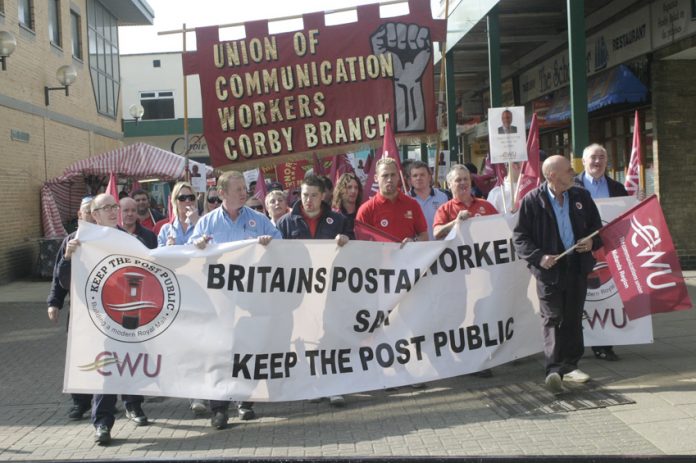
DATES for the planned privatisation of Royal Mail before Christmas are expected to be announced in the House of Commons by Business Secretary Cable today.
He is to announce that Goldman Sachs, Barclays, Bank of America, Merrill Lynch, Investec, Nomura and Royal Bank of Canada are forming a banking syndicate to organise the sale this autumn.
The banks are set to collect 1% of the sale price, which is expected to be £2-3bn.
Cable is to say that members of the public will be invited to buy shares and that 10% of the shares will be handed to postal workers in an attempt to undermine their opposition to the privatisation.
A recent CWU survey of its members found that 98% of members opposed the sell-off.
A cwu officer told News Line yesterday: ‘A forum of all of our Royal Mail reps is to be held on 31st July, where we’ll be putting the suggestion that we go for a ballot of all members of Royal Mail for industrial action.
‘And if that is approved we’ll be taking it forward.
‘We remain staunchly opposed to privatisation.’
However, asked if the ballot would be for industrial action against the privatisation of the Royal Mail, she replied by claiming that such action would be illegal and that the ballot would be on other matters.
On Monday, the union began a week-long open-top bus protest tour of parliament, Royal Mail’s head office and the banks organising the sale.
The union’s general secretary Billy Hayes was quoted in yesterday’s press as saying: ‘We aren’t going to let Royal Mail be sold. We are going to fight every step of the way. A strike is certain.’
Asked if these words were a misquote, the CWU officer told News Line that Hayes had been talking in general terms and that he had not specified what the strike action would be over.
She claimed that a strike against the privatisation of Royal Mail would open the union up to having its funds sequestered and that this would therefore not happen.
Hayes was also quoted as saying he hoped the threat of sustained industrial unrest would scare off institutional investors from buying shares in the state-owned delivery service and force the collapse of the sell-off.